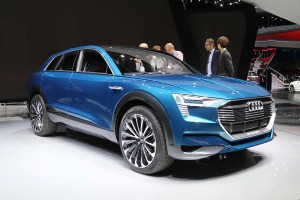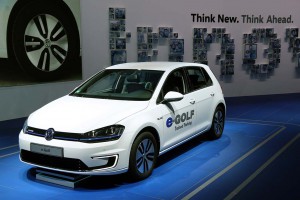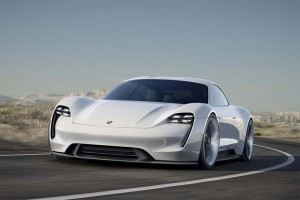Long focused on high-mileage diesels, Volkswagen and its luxury arm Audi are suddenly getting charged up about battery power. So much so, in fact, that virtually all of the vehicles sold by both the mainstream VW and high-line Audi brands will offer some form of “electrified” options in the near future.
The German brands may even start dropping some conventional gas and diesel models in favor of hybrids, plug-ins and pure battery-electric vehicles, officials noted during a series of interviews at the Frankfurt Motor Show. Even sibling brands Bentley and Porsche are getting into the battery act, the former planning a new plug-in SUV, and the sports carmaker coming to Frankfurt with a 600-horsepower performance model.
“Every car will be electrified,” said Ulrich Hackenberg, the board member overseeing technical development at Audi. And while new fuel economy and emissions mandates are factors driving the shift, he also believes that consumers will find the next generation of electrified vehicles attractive and compelling.
(For a closer look at the Audi e-tron Quattro SUV Concept, Click Here.)
The two brands already have a number of battery-based models on the market, including plug-based versions of the VW Golf and the upscale Audi A3. The current offerings suffer from the same limitations as competing battery-based products: limited range, higher costs and weaker performance. But the products Volkswagen and Audi are developing could begin to overcome those problems.
At the beginning of the decade, a kilowatt-hour of batteries cost about $1,000, a significant penalty even on a small vehicle like the eGolf with about 24 kilowatt-hours of lithium-ion cells onboard. But the goal is to get that down to $200 by the time the prototype Audi e-tron Quattro SUV concept goes into production by 2018, said Hackenberg.
Meanwhile, batteries are getting smaller, lighter and more powerful, which will allow Audi to squeeze about 95 kWh into the production model, giving it 500 kilometers, or 310 miles, of range. That would rival the upcoming Tesla Model X SUV, and allow a driver to go more than three times further between charges compared to most of today’s pure battery vehicles.
Performance is also improving when compared to the slow manners of most of today’s electric vehicles. A new version of the Tesla Model S will hit 60 in less than 3 seconds. And Porsche expects to clock similar numbers with the prototype Mission E electric sports car previewed in Frankfurt. The concept vehicle makes a hefty 600 horsepower, and like all battery-electric vehicles, that power comes on instantly, as soon as a driver slams the throttle.
(Click Here to check out the 600-hp battery-powered Porsche Mission E concept.)
Charging is still a potential issue, cautioned both Hackenberg and his VW brand counterpart, Heinz Jakob Neusser. Parent Volkswagen AG is pressing governments in Europe and the U.S. alike to expand the availability of public charging stations, especially high-speed Level III systems which could allow a Porsche Mission E or Audi e-tron SUV to get an 80% top-off in as little as a half-hour.
The various Volkswagen brands are developing their new battery-based powertrains to fit into existing vehicle platforms, wherever possible, and to be able to be produced on the same assembly lines as conventional gas and diesel models. That will simplify production and lower costs, said Neusser.
Meanwhile, going forward, VW might wind up replacing conventional models with those newer battery-electric offerings, whether simple micro-hybrids, conventional hybrids, plug-ins or BEVs, the VW tech chief said.
The German maker is just one of the many looking at its electrified options. BMW and Mercedes-Benz, Cadillac, Toyota and others are planning to bring out longer-range, higher-power battery vehicles in the very near future. And that presents a serious challenge to Tesla, the California-based start-up that has shown what electric vehicles are capable of delivering.
“Tesla gave a push to the market,” said Neusser. “We didn’t learn from its cars, but it did give us a push for things to come quicker.”
(Click Here for complete coverage of the 2015 Frankfurt Motor Show.)




This article needlessly bashes Tesla whose business execution has been flawless. Tesla ALREADY has a large and growing network of super chargers without the involvement of Government investment to do it. Much more importantly VW nor ANYONE cannot produced volume of electric cars without the specific investment in a battery plant such as Tesla has and is making currently. This plant cost billions of dollars to put up and it is largely complete. The first volume manufacturer of an electric car will not be VW or anyone other than Tesla because they are the ONLY ones who have such a battery plant and the availability of lithium cells is not sufficient without such an investment to produce the cars.
Don’t bash Tesla – while the world sleeps they are well on their way to make this a practical reality for everyone.
The electric car is important because of it’s simplicity. Unlike all conventional cars there is no reason for planned replacement of an electric car as their is for hybrid or conventional cars. The list of what is not in them is long and distinguished. Indeed Tesla is produced from all aluminium and will not face the corrosion issues that conventional cars face. A composite constructed electric car could last a lifetime or more with battery replacements every ten or twelve years.
Tesla is so far ahead of everyone else I doubt they can ever catch up. What others want to produce Tesla has already done.
Dan,
While Tesla has won kudos for its products (see our own reviews, a flawless business execution would suggest, ie, profitability and accurate timing of new product launches. Beyond inventing its own accounting procedures, Tesla has been running huge amounts of red ink, and its Model X is more than two years behind schedule. As for sales, the numbers are up, and that’s commendable in a cheap-gas market, they’re still nowhere near a sustainable level, so it remains to be seen if the long-delayed Model X and promised Model III will deliver to both consumers and the bottom line.
Meanwhile, Tesla is facing a concerted assault from a wide range of established manufacturers, including Audi, VW, Mercedes, BMW, indeed, pretty much all luxury and many mainstream brands, who are looking to bring out longer-range electrics and potentially appealing plug-ins.
It’s fine to be a fan-boy, but one needs to step back and gain perspective…read skepticism. That extends, by the way, to the competitors taking on Tesla. They also need prove they can deliver more than, say, a Q7 with a large battery pack, but a truly engaging “electrified” experience.
Paul A. Eisenstein
Publisher, TheDetroitBureau.com
I read the article twice, but cannot see how it, in any way, bashes Tesla, which is by all accounts and the first hand experience of a couple of owners that I am acquainted with, an fantastic car. However, I would imagine that not even Elon Musk would presume to claim that nobody could ever challenge Tesla. Despite Volkswagen’s current debacle regarding their diesel cars, compared to Tesla they are as a giant is to an ant, and a force to be reckoned with.